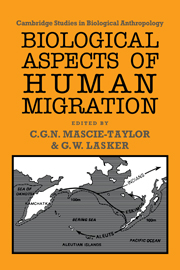Book contents
- Frontmatter
- Contents
- List of contributors
- 1 The framework of migration studies
- 2 Peopling of the continents: Australia and America
- 3 Migration in the recent past: societies with records
- 4 Models of human migration: an inter-island example
- 5 Rural-to-urban migration
- 6 In search of times past: gene flow and invasion in the generation of human diversity
- 7 Migration and adaptation
- 8 Migration and disease
- Glossary
- Index
1 - The framework of migration studies
Published online by Cambridge University Press: 05 March 2012
- Frontmatter
- Contents
- List of contributors
- 1 The framework of migration studies
- 2 Peopling of the continents: Australia and America
- 3 Migration in the recent past: societies with records
- 4 Models of human migration: an inter-island example
- 5 Rural-to-urban migration
- 6 In search of times past: gene flow and invasion in the generation of human diversity
- 7 Migration and adaptation
- 8 Migration and disease
- Glossary
- Index
Summary
Introduction
The impact of migration on human biology is of considerable importance to a wide variety of disciplines including anthropology, demography, epidemiology and genetics. Migration simply means movement of individuals or groups of individuals. To say that someone is a migrant implies emigration from one population and immigration into another. Migration usually refers to spatial (geographic) movement although it is also used to define social or occupational mobility. The authors of this book intend the narrower definition and ‘migration’ here refers to geographical displacement of people: changes of residence involving introduction of individuals into a different locale. If the extent, direction and orientation of the movement are not specified, migration remains qualitative and the differentiation is merely between migrants and non-migrants.
The biological aspects of migration have more to do with the consequences than with the causes of such movements of people. Therefore the focus of this book is not so much on why people choose or are forced to move but on the biological implications of that movement to both recipient and donor populations. Consequently, although labour migration is important socially and economically, it is only considered here (see Chapter 8) if there is some adaptive or maladaptive component to movement. Likewise the movement of refugees is considered only from the point of view of the results of biological stresses that cause or are incidental to the displacements and we shall not deal with the social aspects of human suffering caused by refugeeism, this common outcome of forced mass migration.
- Type
- Chapter
- Information
- Biological Aspects of Human Migration , pp. 1 - 13Publisher: Cambridge University PressPrint publication year: 1988
- 6
- Cited by



